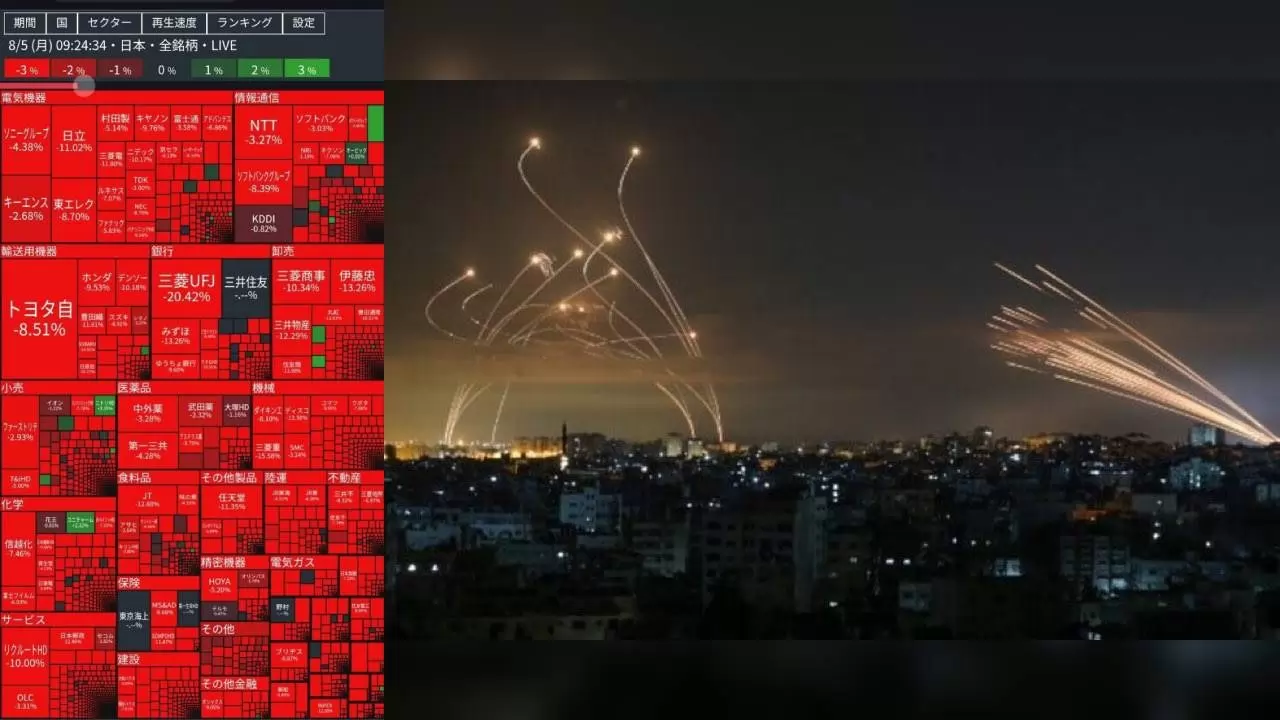
Japan stock market crash, missile exchange between Israel, Palestine. (X/JengaHustle)
New Delhi: Global stock markets are experiencing severe declines amid escalating tensions in the Middle East. Japan's stock market has been the hardest hit, plummeting more than 10%. Turkey's market has also seen a significant drop of 7%, while Taiwan's stock market suffered its worst day in 57 years. Major tech companies have faced substantial losses within 24 hours:
Additionally, over $1 billion has been liquidated from the cryptocurrency market in the past 24 hours, further contributing to financial instability.
The Financial Times reports that global markets are "rattled by the prospect of a US recession," compounding the economic uncertainty fueled by geopolitical tensions. As the Americans wait to choose their new president from Donald Trump and Kamala Harris, the nation is also slowly sledging towards recession.
The Middle East is on the brink of significant conflict, with escalating hostilities between Israel and Iran. Reports suggest that Israeli Prime Minister Benjamin Netanyahu received approval from the US to target the Hamas leader in Tehran, heightening the likelihood of direct confrontation.
Iran's potential retaliation appears imminent, with threats to destroy airports, ports, and military bases across Israel. This development has led to fears of a broader conflict involving multiple nations. It seems that Iran will not carry out a symbolic attack this time and will destroy airports, ports, and military bases throughout Israel.
In response to these rising tensions, the United States has significantly bolstered its military presence in the region. This includes deploying advanced military assets such as aircraft carriers, missile defense systems, and additional troops. This move aims to deter aggression from both sides and reassure US allies of its commitment to maintaining stability and security.
Key US allies in the region, including Saudi Arabia, the United Arab Emirates, and Bahrain, have heightened their military readiness. These countries have increased their defense capabilities, conducting drills and preparing for any potential fallout from an Israel-Iran conflict.
Despite the rising tensions, diplomatic channels remain open. Various international actors, including the United Nations and European Union, are actively working to mediate and de-escalate the conflict. The potential for conflict has already impacted global oil markets, with prices fluctuating amid fears of supply disruptions. Any significant conflict could lead to severe economic repercussions worldwide.
Civilians in the region are bracing for potential conflict, with many fearing the humanitarian impact of a full-scale war. There are growing concerns about the safety and security of the population, particularly in areas that may become conflict zones. The international community is preparing for potential humanitarian aid and support.
The hostility between Israel and Iran is deeply rooted in historical grievances and geopolitical rivalries. Fighting between Israel and Hezbollah has claimed the lives of at least 542 Lebanese citizens, the majority of whom were militants, but also included 114 civilians.
In light of the growing tension, Indian nationals living in Israel have been urged to exercise caution and follow safety procedures. The Indian Embassy in Beirut has strongly advised against visiting Lebanon until further notice, urging those already in the country to leave.





Copyright © 2025 Top Indian News
